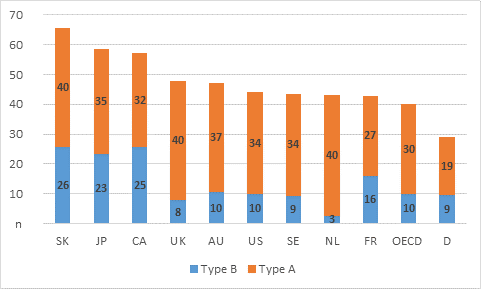Often, I think, I am seen as a bit of a downer on Canada. It goes with the territory: my role in Canadian higher education is i) “the guy who knows what’s going on in other countries and ii) “the guy who pokes the bear”. So frequently I ending up writing blogs saying why isn’t Canada doing X or wouldn’t it be great if we were more like Y, and people get the impression I’m down on the North.
Not true. I think we have a pretty good system, one most of the world would envy if we could ever stop admiring our minute inter-provincial differences and explain our system properly. Among OECD countries, we’re always in the top third of pretty much any higher education metric you want to use. Never at the very top, but reasonably close. It’s just that it’s not cheap, is all. We’re never going to win any prizes for efficiency; countries like Israel, the Netherlands and Australia perform far better on those metrics.
But there is one area in which Canada does a fantastic job and doesn’t even realise it. And that is the extent to which it has a strong culture of work-oriented higher education which is matched by few other countries.
Let’s start with our colleges and polytechnics, which for the most part deliver labour market-oriented professional education at a level known by UNESCO and OECD as “Type 5B” (bachelor’s degree programs are called “Type A”). Among OECD countries only Japan and Korea do a greater proportion of young people have this kind of education.
Figure 1: Level 5 (post-secondary education) Attainment Rates of 25-34 year olds, Select OECD Countries
We sometimes hear complaints from colleges and polytechnics about not getting enough respect, but the fact is, Canada has arguably the best-funded and most successful non-university post-secondary education system in the world. We should say it, and celebrate it.
What about the university system, you say? Well, the University of Cincinnati may have invented co-op education, but I don’t think there’s much doubt that the University of Waterloo perfected it. Last time I checked, they were arranging over 17,000 co-op experiences for students every year. And institutions across the country have adopted the idea as well. Personally, I think that’s a result of competition from our excellent college sector: it keeps universities on their toes.
And OK, it’s easy to scoff at university claims that 40% of students get some kind of work-integrated learning experience because so many of them are so short-term and of not-particularly high quality, and because at least a few universities seem to care more about classifying as things as possible as “experiential” than actually creating more such experiences: but so what? The fact that we’re having the debate at all suggests we are on the right track. And that’s a sight better than most other countries I could name.
Now, I know some of you are going to say “but Germany! Switzerland! Apprentices!”. And there are some admirable things about those systems (though, as I have said before), Canadians deeply misunderstand what it is apprenticeships in Germany actually do). Namely, they aren’t post-secondary in nature (note how low Germany’s Type B score is in the figure above); rather, they’re part of the secondary system and in many ways are designed to keep people out of the post-secondary system. It’s hard to compare out system to theirs.
So, in sum: could we do more on experiential and work-integrated learning? Of course we could (and should). But stop and smell the roses: compared to most places, we do a pretty good job on this stuff. And we should acknowledge that to ourselves even if, in true Canadian fashion, we’re a little reluctant to say so to anyone else.


 Tweet this post
Tweet this post
